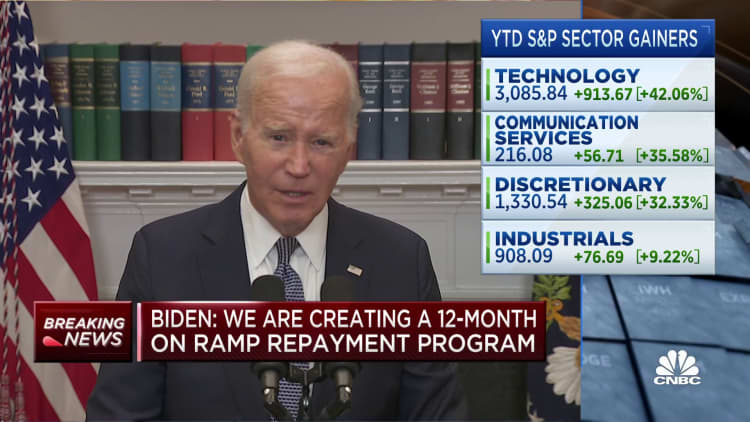It's the end of an era for student loan borrowers.
After a three-year reprieve, interest began accruing again on federal education debt as of Sept. 1. In October, millions of borrowers will make their first student loan payment since before the Covid-19 pandemic hit.
The pause on student loan payments, which has been in effect since March 2020, saved the average borrower about $5,000 in interest, according to an estimate by higher education expert Mark Kantrowitz.
Now the loans are back to their pre-pandemic rates, typically between 3% and 7%.
More from Personal Finance:
More unmarried couples are buying homes together
Some costly financial surprises for first-time homebuyers
61% of adults live paycheck to paycheck
But because interest accrual on federal student loan works differently depending on your loan type and life status, borrowers should learn what the recent changes mean for them, experts say.
Here's what to know.
1. In-school borrowers
For student loan borrowers who are still in school, they may or may not see the interest on their debt accrue again this month. It depends on their loan type, Kantrowitz said.
Undergraduate subsidized student loans should not start racking up interest until after you've graduated and finished your six-month grace period. On the other hand, the interest on unsubsidized loans, common for graduate students, begin collecting interest as soon as they're disbursed.
Likewise, holders of these loans will see their debt grow if they've returned to school for another degree, even if they enroll in an in-school deferment. Many borrowers are automatically put into this status.

The interest on undergraduate subsidized loans is usually suspended while you pursue more schooling.
You can contact your loan servicer or visit StudentAid.gov to learn your loan type, said Betsy Mayotte, president of The Institute of Student Loan Advisors, a nonprofit organization.
2. Recent graduates
Most graduates get a so-called grace period after they've finished school before they need to start making their student loan payments. This period is usually six months, although in some cases, it's nine months.
You won't see the interest on your undergraduate subsidized loans collect until you've exited this window. Again, unsubsidized loans continue to grow.
Months during the pandemic-era pause count toward your grace period, Kantrowitz said.
3. Those struggling
Struggling borrowers may have options when it comes to keeping their interest suspended.
They should first see if they qualify for a deferment, experts say. That's because their loans may not accrue interest under that option, whereas they almost always do in a forbearance.
If you're unemployed when student loan payments resume, you can request an unemployment deferment with your servicer. If you're dealing with another financial challenge, meanwhile, you may be eligible for an economic hardship deferment.
Those who qualify for a hardship deferment include people receiving certain types of federal or state aid and anyone volunteering in the Peace Corps, Kantrowitz said.
With both a hardship and an unemployment deferment, interest generally doesn't accrue on undergraduate subsidized loans. Unsubsidized loans will rack up interest.
The maximum amount of time you can use an unemployment or hardship deferment is usually three years, per type.
Other, lesser-known deferments include the graduate fellowship deferment, the military service and post-active duty deferment and the cancer treatment deferment. You should ask your servicer if your loans will continue to grow under these varied options because each case is different.


